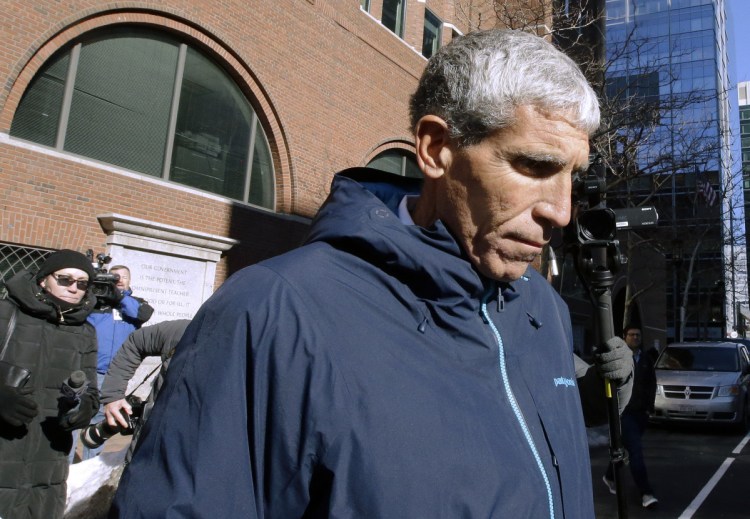He offers his services as a “master coach” in a college counseling business called “The Key” that aims to help teenagers develop a “personal brand,” helping them stand out from tens of thousands of others seeking admission to elite schools.
A website promoting the California-based business claims that founder Rick Singer has worked one on one with students and parents “on devising a game plan for life.” Over the past 20 years, the site says, Singer has helped numerous applicants attain “an undergraduate or graduate degree in every field imaginable.”
Federal authorities tell a darker story about William “Rick” Singer: that he orchestrated a brazen scheme to facilitate cheating on admission tests and bribery of college athletics coaches, all to help children of wealthy parents obtain admission to prestigious universities.
Court documents made public Tuesday indicate that Singer, 58, of Newport Beach, California, agreed to plead guilty to racketeering conspiracy, money laundering conspiracy and other charges in hopes that aiding government investigators would help him obtain a lenient sentence.
The scandal the investigation unearthed rocked the college admissions world with revelations of tainted SAT and ACT admission test scores and alleged misdeeds of athletics coaches from Yale, Stanford, Georgetown and Wake Forest universities and the universities of Southern California, Texas at Austin and California at Los Angeles.
Authorities charged dozens in the case but did not allege that students committed crimes and did not accuse the universities of wrongdoing.
According to the U.S. attorney’s office in Boston, Singer conspired with parents, athletic coaches, an athletic administrator and others to use bribery and other fraud to secure admission for applicants to some of the nation’s most competitive universities. Admission rates at Yale and Stanford are lower than 10 percent, and they are also quite low at other schools Singer targeted.
Singer was identified in a criminal complaint as Cooperating Witness 1, or CW-1, with prosecutors noting that he hoped for a lenient sentence in return for aiding investigators.
The complaint shows the web of deceit Singer wove, in some cases arranging for an impostor to take tests for students and in others superimposing the faces of applicants onto the photos of athletes.
In the transcript of one conversation, CW-1 tells a father that he can help his daughter get a certain SAT or ACT score if she obtains special testing accommodations for a learning disability. “I can guarantee her a score,” CW-1 says. “If it’s ACT, I can guarantee her a score in the, in the 30s. And if it’s the SAT, I can guarantee her a score in the 1400s.” The maximum possible scores are 36 for the ACT and 1600 for the SAT. The price for doing that, CW-1 indicated, was $75,000.
In another conversation, CW-1 assures another parent that his daughter can apply to a university as a potential water polo player even though she was unqualified in the sport. The price for one step in that arrangement was $50,000. The parents asks: “OK, so there’s no chance I give that 50 and then she’s not admitted?” CW-1 replies: “You won’t send it until you get the letter.”
A phone message left on a number for Singer’s business was not returned.
College admission consultants said Tuesday they were aghast at the scandal and sought to distance their profession from Singer. One compared Singer to a former personal attorney for President Donald Trump who faces a prison term for campaign finance violations and other crimes.
“He’s in this business like Michael Cohen is in the lawyering business,” said Arun Ponnusamy, chief academic officer for Collegewise, based in Irvine, California. “The guy’s a fixer. He’s not an educational consultant.”
Ponnusamy said he occasionally heard about Singer in the Southern California consulting market but was suspicious of him. “You can sniff out who’s a scam,” he said.
Singer’s website also notes he was an executive in the call center industry and claims he helped create an online high school.
The Sacramento Bee reported that Singer appeared to get his start helping students in the Sacramento area of northern California. He told the Bee in 1994 that he was filling a void left by overworked high school advisers. “It’s not that school counselors don’t want to help. It’s just that they often don’t have the time,” the Bee quoted him as saying.
Singer wrote a book published in 2014 called “Getting In: Gaining Admission to your College of Choice.” An Amazon listing for the book describes Singer as a “26 year coaching veteran with 250,000 success stories of families that were able to gain admission to the school of their choosing and take the first steps to a life-fulfilling future.” Chapter 33 of the book was headlined “Kiss Up to Your Teachers.” Chapter 41 was “Hitch Up Your Safety Net.”
Representatives of the National Association for College Admission Counseling, based in Arlington, Virginia, and the Independent Educational Consultants Association, based in Fairfax, Virginia, said Singer was not a member of those groups.
Mark Sklarow, chief executive of the Independent Educational Consultants Association, said he had heard of Singer’s company and did not like the way it was marketed. He said Singer had breached all professional standards.
“At the core is our belief that the consultant’s job is to fairly reflect a student’s abilities, needs and everything about them,” Sklarow said. “Any deception that’s done only hurts the student. If you think your job as a consultant is to ‘get your kid in,’ that’s not correct.” The job, Sklarow said, is to help a student “find the right place.”
Send questions/comments to the editors.


